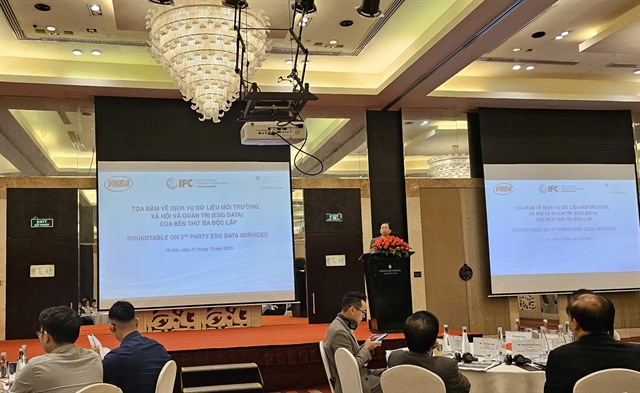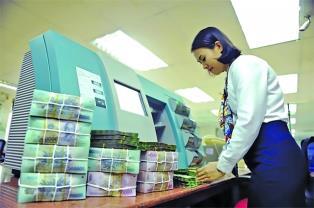While some multinational companies collect and audit sustainability data from suppliers, such practices remain rare in Việt Nam.

By Ly Ly Cao
HÀ NỘI — As Việt Nam intensifies its climate action and green growth goals, the banking sector is taking a decisive step to integrate Environmental, Social and Governance (ESG) principles into financial operations.
The International Finance Corporation (IFC), in partnership with the Vietnam Banks Association (VNBA), convened a high-level roundtable on 'Third-Party ESG Data Services' on October 21, highlighting the growing importance of reliable ESG data and independent verification in shaping the nation’s sustainable finance landscape.
The roundtable aimed to enhance understanding among financial institutions about the types of ESG data needed for effective client assessment and informed lending decisions.
"Globally, supply chain finance potential is estimated at over US$20 trillion, but only about US$4–5 trillion of that is currently realised," said Jinchang Lai, Principal Operations Officer, Financial Infrastructure Lead for Asia and the Pacific at IFC’s Financial Institutions Group.
"Given the global sustainability agenda, the power of large buyers and sellers should be leveraged to pressure and incentivise suppliers and distributors toward higher sustainability standards. This is the essence of sustainable supply chain finance."
Lai noted that while some multinational companies collect and audit sustainability data from suppliers, such practices remain rare in Việt Nam.
"Most financiers and major buyers need reliable data to assess ESG performance, and this data often must come from third-party players," he said, citing international examples such as EcoVadis, Control Union and other firms providing ESG audits and analytics.
"In Việt Nam, these third-party services are still at an initial stage. That's why IFC, with the support of SECO and relevant government institutions, is working to promote the availability of ESG data and analytics services to strengthen sustainable finance."
The IFC’s initiative aligns with Vietnam’s broader policy objectives. The government has pledged net-zero emissions by 2050 and incorporated sustainability principles into its national development strategies. The financial sector has increasingly embraced green finance, climate finance and sustainability-linked lending. However, data reliability remains a key bottleneck.
According to the Institute for Policy and Strategy Studies, ESG awareness among Vietnamese enterprises is improving but uneven.
"A 2024 survey found that 39 per cent of enterprises had never heard of ESG and 62 per cent were unfamiliar with relevant national regulations," said Vice President of the Institute Nguyễn Hoa Cương.
"Only 54 per cent of businesses have implemented partial ESG commitments, while a significant portion remains in the planning stage or unaware of the concept."
He noted that despite these challenges, market demand for sustainable practices is growing rapidly.
"Investors are increasingly prioritising ESG performance. According to KPMG, 64 per cent of investors are willing to pay a premium for Vietnamese exports with strong ESG qualifications, especially in energy and environmental sectors," Cương added.
"Younger workers and consumers also favour companies with strong ESG commitments, reflecting a generational shift in expectations."
Cương said that while social and governance practices are more widely adopted, environmental performance lags behind, with only about half of surveyed firms integrating environmental criteria into their operations. This gap underscores the need for greater financial and technical support.
Experts at the roundtable also discussed systemic barriers to ESG adoption, including limited financial capacity, underdeveloped corporate governance structures and insufficient access to verified data. PwC's 2022 Vietnam ESG Readiness Report found that although 80 per cent of businesses claim to have ESG commitments, 71 per cent lack understanding of the data required for proper reporting.
To address these challenges, participants agreed that Việt Nam’s path forward must include developing a robust ESG data ecosystem, encompassing local verification bodies, rating agencies and analytics firms, to ensure data integrity and transparency. — BIZHUB/VNS





